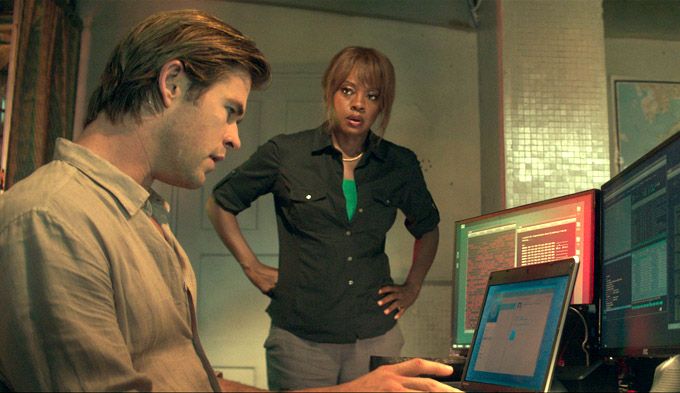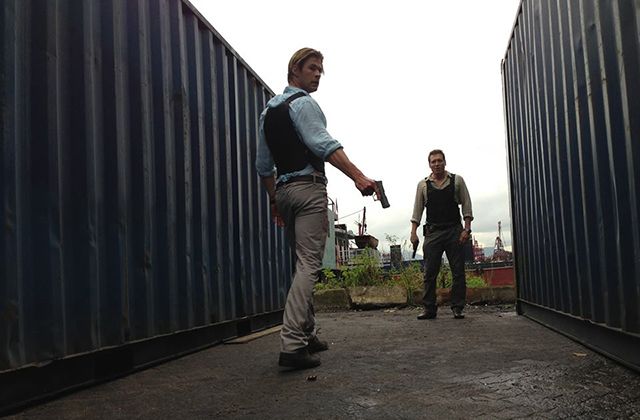Blackhat, Michael Mann’s latest exploration of gun-metal-gray machismo, is coolly executed but emotionally cold – a really slick, R-rated episode of NCIS that largely succeeds at validating criticisms that the Heat director’s best days are far behind him.
When a Chinese nuclear reactor suffers a meltdown and the stock market booms with rising soy futures, no-nonsense FBI Agent Barrett (the always-good Viola Davis) and Chinese operative Chen Dawai (the bland Wang Leehom) must team up to track down the cybercriminal – a “black hat” hacker -- behind the incidents.
The only one who can help them stop the bad guy? Another black hat: Chris Hemsworth’s Nicholas Hathaway, a friend of Chen’s at MIT before the hacker landed in prison. However, it’s Hathaway’s code being used in the malware attacks, so he’s the best person for the job.
Related: Chris Hemsworth and Viola Davis Battle Cyber Terror in Michael Mann's "Blackhat"
Soon, Hathaway & Co. embark on one of the most intermittingly thrilling and checking-your-watch dull big-screen procedurals, as their hunt for the bad guy takes them from China to Los Angeles, then back to China for some reason, before embarking to Jakarta for a climatic guns-drawn, knives0out showdown between the hero and the villain -- where the former employs a fighting style best described as “Prison Yard-Fu” to shiv his way to victory.
A frustratingly unearned romantic subplot between Hathaway and – sigh – Chen’s sister drags things down and gets unintentional laughs from the audience, especially when the film would have you believe the two finally connect because she can’t resist a man after he’s punched a thug in the face and throat with a dinner table.
Blackhat suffers from the same problem all cyber thrillers do: How do you make the world of computers and cybersecurity worth the audience’s emotional investment? Not even a director as skilled as Mann can figure that out, because audiences find it difficult to connect with characters whose artillery is keystrokes and who stare intently at code and type really fast. And despite Blackhat’s frequent attempts, typing is never interesting.
What we’re left is a near-constant struggle to relate to or even remotely like the characters – especially Hathaway. He speaks in a hoarse, Brooklyn-y accent and spouts such prison wisdom as “I do the time, the time doesn’t do me,” elaborating that his years of incarceration have allowed him to develop his mind and body to a place of lethality that would make Jason Bourne sweat.
This rationale is an attempt to justify why Hathaway can lay down HTML one minute, then semiautomatic gunfire the next, but it doesn’t work. Mann’s detail-oriented sensibility pays off in a fun beat where Hathaway improvises a Kevlar vest by taping thick magazines to his torso before the final fight. Touches like those give the film a personality that Morgan Davis Foehl’s lacks, but not enough to retain or warrant any significant investment. Even more surprising is how little time the movie devotes to making the lead villain, played by Yorick van Wageningen, a worthy adversary. His maybe 10 minutes of screen time put his threat level at slightly less than a T-shirt, and when you realize his evil plan -- which starts with giving a China a case of Chernobyl and ends with manipulating the price of tin – you’re left with an antagonist who brings zero stakes and tension to the third act.
The one character that comes close to being the exception here is Barrett; Davis gets some of the film’s best one-liners and speeches, only to be undercut by a scene that seals her fate and gives what could have been a great blaze-of-glory moment to a male character we barely know and care even less about.
The only thing more frustrating than the aforementioned choices is Mann’s shaky-cam, DV aesthetic. The dramatic beats unfold largely in askew close-ups, the action plays out mostly in gritty, GoPro establishing shots – neither one is effective, and the digital format works against the proceedings because the story can’t match its immediacy. Case in point: a big shootout at the midpoint, in which the thunder of machine guns echoes along concrete tunnels as bullets ping off shipping containers. More attention was paid to the deafening realism of the sound mix than to the emotional and physical geography of the action, leaving us less thrilled and more confused. (It’s the type of set piece in which we’re expected to care when a Red Shirt in TAC gear that we barely know gets shot because our hero kneels down beside him.)
Despite Blackhat’s problems, it’s not a terrible film. It’s just dull and soulless, which is worse.
The story Mann seems to care about telling has nothing to do with hacking or microscopic close-ups of active circuitry. It’s loners with a tradecraft, guys who have a “code” – and not one you can put on a hard drive. Those sensibilities seem to have been grafted onto something that Blackhat’s inherent story can’t support. In a way, that leaves us wishing they had just revisited Mann’s older works, because his newest isn’t worth the time.
Blackhat opens today nationwide.



